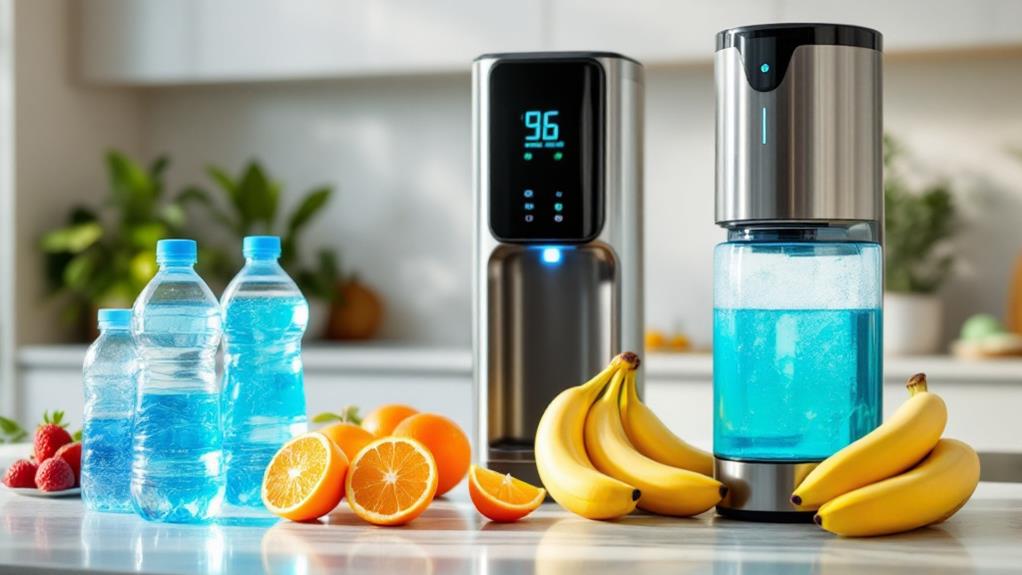How to Eat Like Gold Medal Olympic Athletes: Nutrition Tips for Peak Performance

To eat like a gold medal Olympic athlete, focus on a diet that matches your training intensity and sport. Fill 50-70% of your plate with high-quality carbohydrates like whole grains and fruits for sustained energy. Incorporate approximately 1.2 grams of protein per kilogram of body weight daily for muscle repair. Proper hydration is key; drink 500-700 mL of fluids two hours before exercise and monitor your urine color. Personalized nutrition, ideally managed with a sports dietitian, helps align dietary habits with athletic goals. As you fine-tune your regimen, your performance can steadily ascend to its peak potential.
Fueling With Carbohydrates
How do you guarantee peak performance during training and competition? As an elite athlete, you must prioritize carbohydrates as your primary fuel source. Aim to derive 50-70% of your caloric intake from carbs to power both your brain and muscles. This strategy is essential for maintaining high energy levels and optimizing your performance. Choose high-quality carbohydrates like whole grains, fruits, and vegetables. These foods help sustain energy and improve your athletic abilities.
Carbohydrates play a significant role, especially when you're dealing with intense training sessions or competitions. Endurance athletes, in particular, require a higher intake to meet their energy demands. It's not just about consuming carbs, but also timing them correctly. Eating them before a workout loads your muscles with glycogen, preparing you for intense exertion. Post-exercise, they're critical for replenishing the glycogen stores you've depleted, ensuring you're ready for your next session.
Individual carbohydrate needs can vary based on your sport and the intensity of your training. Fine-tuning your carb intake helps you maintain peak performance. By focusing on carbohydrates, you support your body's needs and elevate your athletic potential.
Protein for Recovery
To guarantee peak recovery and muscle growth after intense training, you need to prioritize increased protein intake. Meeting your protein needs is vital for enhancing muscle repair and growth. Aim for about 1.2 grams of protein per kilogram of your body weight. This isn't just about quantity; timing matters too. Incorporating protein-rich foods like lean meats, dairy, legumes, and nuts into your meals, especially post-workout, can make a significant difference.
Research suggests consuming approximately 20-30 grams of protein after training is effective in stimulating muscle protein synthesis. By front-loading protein throughout your day, you can optimize recovery outcomes. Make sure your post-workout meal includes lean protein options to give your muscles the best chance to recover and grow. This approach helps in improving strength and total recovery, ensuring you're ready for your next training session.
Consistent protein consumption is fundamental, particularly during rigorous training regimens or weight management phases. It helps maintain your muscle mass and keeps you in peak condition. By focusing on your protein needs and incorporating lean protein into your diet, you're setting yourself up for success in your athletic pursuits.
Hydration Essentials

Staying properly hydrated is crucial for maintaining peak athletic performance. Even slight dehydration can impair your strength, endurance, and cognitive function. To keep your performance sharp, you need to monitor your hydration status. Check your urine color; aim for a light yellow shade, which indicates proper fluid balance.
Your body requires fluids and electrolytes, especially during prolonged activity, to support general health and performance. Sports drinks can be a great option to replenish lost electrolytes during intense training or competition. However, your hydration needs are unique and depend on factors like climate, training duration, and intensity. This means you should adjust your fluid intake based on these conditions.
To get started, consider consuming 500-700 mL of fluid two to three hours before exercise. This will guarantee you're adequately hydrated as you begin your workout. During activity, continue sipping on fluids, and don't forget to rehydrate afterward to aid recovery. Remember, staying well-hydrated not only enhances your performance but also supports your overall health, helping you feel your best both on and off the field. Keep your water bottle handy, and listen to your body's cues for hydration needs.
Tailored Nutrition Plans
While hydration lays the foundation for peak performance, a tailored nutrition plan improves your athletic potential. Your plan should be customized to suit the demands of your specific sport, training intensity, and personal health goals. Collaborate with a sports dietitian to develop a strategy that considers your caloric needs, macronutrient ratios, and meal timing. This approach guarantees you're fueling your body effectively, optimizing both performance and recovery.
Keep track of your dietary habits through food and training logs. This allows you to identify what works and make necessary adjustments for better outcomes. Your nutrition plan should evolve with your training phases, adapting to off-season and competition periods to meet changing energy and recovery needs. This dynamic approach helps you maintain peak performance year-round.
A sports dietitian is crucial in maneuvering any unique dietary restrictions or preferences you might have. Their expertise assures you're receiving the right nutrients, regardless of these challenges. By focusing on individualized nutrition strategies, you'll support your body's requirements throughout distinct training stages, ultimately improving your overall athletic performance. Tailored nutrition plans are your blueprint for success, providing the foundation you need to reach your goals.
Balancing Overall Wellness

Although nutrition plays a critical role in athletic performance, balancing thorough wellness is likewise crucial for sustained success. As an athlete, your daily diet should be rich in whole foods to maintain both physical and mental function. This balance directly impacts how you perform and recover. Regularly assess your dietary habits to identify areas that need improvement. This guarantees your nutritional needs align with your training regimen.
Collaborating with a nutritionist can offer tailored advice that meets your unique health conditions and athletic goals. Such expert guidance improves your overall wellness, allowing you to fine-tune your daily diet for peak performance. Remember, it's significant to enjoy your food and maintain flexibility in your dietary choices. Doing so can elevate your psychological well-being and reduce the risk of underfueling, which can lead to negative health outcomes.
Incorporate nutrient-dense foods in your meals and focus on hydration strategies. These elements are crucial for sustaining energy levels and supporting effective recovery after intense training or competition. By prioritizing these aspects of wellness, you set yourself up for long-term success in your athletic experience.
Caloric Needs and Strategies
Understanding your body's caloric needs is essential to maximizing athletic performance and ensuring sustained energy levels. As an athlete, your caloric requirements can vary considerably depending on your sport's demands. For instance, endurance athletes like swimmers might need an extra 2,000 to 4,000 calories daily to support their energy expenditure. It's significant to recognize that each sport has specific evidence-based calorie ranges. Calculating your needs often involves determining grams of calories per kilogram of body weight, which helps create a nutrition plan tailored to you.
To fine-tune your strategy, consider metabolic testing. This can provide valuable insights into your resting metabolic rate and body composition, allowing you to develop a personalized caloric plan. Consulting with a registered dietitian is also imperative. They play an essential role in designing sport-specific fueling plans that account for your unique training demands, goals, and meal timing for peak performance.
Moreover, monitoring your daily energy expenditure through wearable technology can be a game-changer. This data helps you adjust your caloric intake to match activity levels, ensuring you're meeting your fueling needs effectively. By understanding and managing your caloric needs, you can optimize your athletic performance.
Role of Macronutrients

For athletes aiming for peak performance, macronutrients play a critical role in fueling the body efficiently. Carbohydrates should make up 50-70% of your caloric intake, acting as the primary energy source for both your brain and muscles during intense training and competition. Adjusting your macronutrient ratios is crucial depending on your training intensity and the phase you're in. Endurance athletes often need more carbohydrates and protein compared to those focusing on strength.
Protein is a key player in muscle repair and growth. Depending on your training level and goals, you should consume between 0.8 grams to 1.2 grams of protein per kilogram of body weight. This guarantees your muscles recover and grow effectively, keeping you ready for the next challenge. Fat shouldn't be overlooked either; it should account for about 20-30% of your total calories, supporting energy needs and hormone production.
Supplements and Performance
Supplements can play a significant role in enhancing athletic performance when used wisely. For example, creatine supplementation is highly regarded for increasing strength and power output, especially in high-intensity sports. This can be a game-changer if you're involved in activities requiring short bursts of energy. Similarly, branched-chain amino acids (BCAAs) support muscle recovery and help reduce soreness after intense workouts, allowing you to train more effectively each day.
Including omega-3 fatty acids, typically found in fish oil, can also be beneficial. These supplements can reduce inflammation and improve joint health, vital aspects when you're pushing your body to its limits. When your daily intake of calories a day doesn't quite meet your nutritional needs, multivitamins can fill these gaps by providing important vitamins and minerals for peak performance.
However, before starting any supplement regimen, it's important to consult a healthcare professional. They can guide you on safe choices and guarantee that none of the supplements you consider contain banned substances that might jeopardize your athletic eligibility. Remember, supplements are just one part of the equation, complementing a balanced diet and consistent training to help you reach maximum performance.




